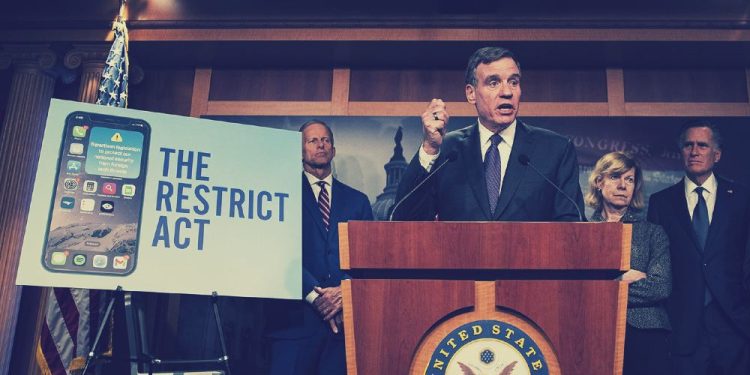Earlier this month, Senator Mark Warner (D-VA) introduced the Restricting the Emergence of Security Threats that Risk Information and Communications Technology Act, or the RESTRICT Act. The bill is being floated as a possible means for the federal government to ban TikTok over its connection to the Chinese government. However, the RESTRICT Act’s vague language and broad scope has many voicing concerns about the bill’s threat to free speech and freedom of expression.
But, as Murray Rothbard has pointed out, “human rights, when not put in terms of property rights, turn out to be vague and contradictory.” Your freedom to have an opinion does not grant you the right to express that opinion in venues or on media outlets you do not own. But if you pay to give a speech at a lecture hall and the government blocks it, this violation of free speech could be better understood as a violation of property rights. So how would property rights fare under the RESTRICT Act? Not well. The bill would not only block private companies from engaging in legitimate business practices but would further violate the property rights of American citizens and companies through an open-ended digital surveillance regime.
The RESTRICT Act seeks to give the Commerce Department broad new authorities to “identify, deter, disrupt, prevent, prohibit, investigate, and mitigate” information and communications technology products “in which any foreign adversary has an interest, and that pose an undue or unacceptable risk to U.S. national security or the safety of U.S. persons.” The bill defines foreign adversaries as China, Russia, Iran, Cuba, Venezuela, and North Korea, but it allows the Executive to add and drop foreign regimes from the list without oversight from Congress.
The information and communications technology products highlighted in the act are expansive and unspecific. They range from desktop applications, mobile apps, web-based applications, payment platforms, and gaming systems to webcams, Wi-Fi networks, drone cameras, home surveillance systems, and even biotechnology.
It’s worth mentioning that the only real threat the alleged adversarial regimes pose is to Washington’s ability to exert military control over the entire globe. The root of this issue lies in America’s overzealous foreign policy aspirations—not in some irrational wish by these regimes to see American people harmed. The proper way to address these threats is to bring American foreign policy back in line with reality as Washington’s unipolar moment slips away. The RESTRICT Act ignores the root of the problem and instead attacks the rights of the American people.
Our right to property stems first from our right to self-ownership. We alone own our bodies. Any property claim made on our bodies is unethical and impossible. From self-ownership, property can be attained justly through homesteading—mixing one’s labor with unowned land resources. After property has been homesteaded, it can be justly transferred through gifts or voluntary exchange. That is how most property is justly acquired in modern societies.
Unfortunately, we do not live in a perfectly libertarian world. But property rights are still important and, to the extent they exist, must be defended. As such, if a someone wishes to read, watch, or listen to a foreign government—maybe they want to hear both sides of a geopolitical dispute to be better informed—and a website owner is willing to deliver that piece of media to them, it is completely within the rights of both the consumer and website owner to engage in that transaction.
Further, it is the right of those who own the internet service provider, data center, and optical fiber cables to make part of their infrastructure available for the information transfer if they find the price to be worth it. Even if the information originated from or encountered a foreign regime, any third party stepping in to stop this transaction would be violating the right of the individuals involved to control their own property.
The conduct that the RESTRICT Act seeks to prohibit is not a real crime. And beyond that, the state surveillance of private activity necessary to identify the relevant transactions is where the majority of property rights violations will occur. The bill makes numerous references to the use of information gathered by the director of national intelligence. Although we’re told US intelligence agencies focus on gathering information and conducting operations outside of the United States, whistleblower Edward Snowden revealed that agencies such as the National Security Agency conduct mass surveillance of American’s communications. The RESTRICT Act could ratchet this up by extending the surveillance beyond communications to include digital information of any kind. By accessing devices without express permission, the federal government would further violate our property rights.
There is even more of concern. With its vague language, the bill gives the government much leeway in defining what qualifies as illegal information. We’ve already seen government officials and their friends in media conflate antiestablishment arguments with foreign disinformation. They’ve even falsely labelled accurate news stories as foreign disinformation. It’s not hard to see these same people using the powers granted to them by the RESTRICT Act to criminalize certain dissenting views under the guise of counterintelligence.
This awful bill seeks to prop up Washington’s disappearing global military dominance by making certain pieces of digital information illegal. The implementation of the RESTRICT Act would violate the American people’s basic right to control their property—all in the name of thwarting a fake crime. The bill isn’t protecting you from a threat. It is the threat. Don’t fall for it.
About the Author
Connor O’Keeffe is a writer and video producer at the Mises Institute. He has a masters in economics and a bachelors in geology.
Article cross-posted from Mises.





